Akagera National Park is the ultimate safari experience for anyone visiting or living in Rwanda.
I remember going there with my family. I was wondering, “How do we think going to a place full of dangerous animals is fun? We’re serving ourselves as dinner.” I was anxious (especially when we saw an elephant pass by our car, I froze!).
A few seconds into the park, I was mind blown. From all the birds I had never seen getting up-close and personal in a hippopotamus’ swim time, I did not want to leave the park, and here is why.
[toc]
What to Expect
Akagera is the only Big Five park in Rwanda. It’s not just home to some of the biggest mammals. It’s also one of the best places for bird lovers, with more than 482 bird species – including rare species like the prehistoric shoebill. For one park, the diversity of habitats is unique. The fact that it includes lakes, marshes, savannah, mountains, and woodland makes for spectacular scenery.
On top of all that, Akagera offers a variety of tourism activities, some of which require minimum participant numbers. Boat trips, fishing, night drives, and so many exciting activities
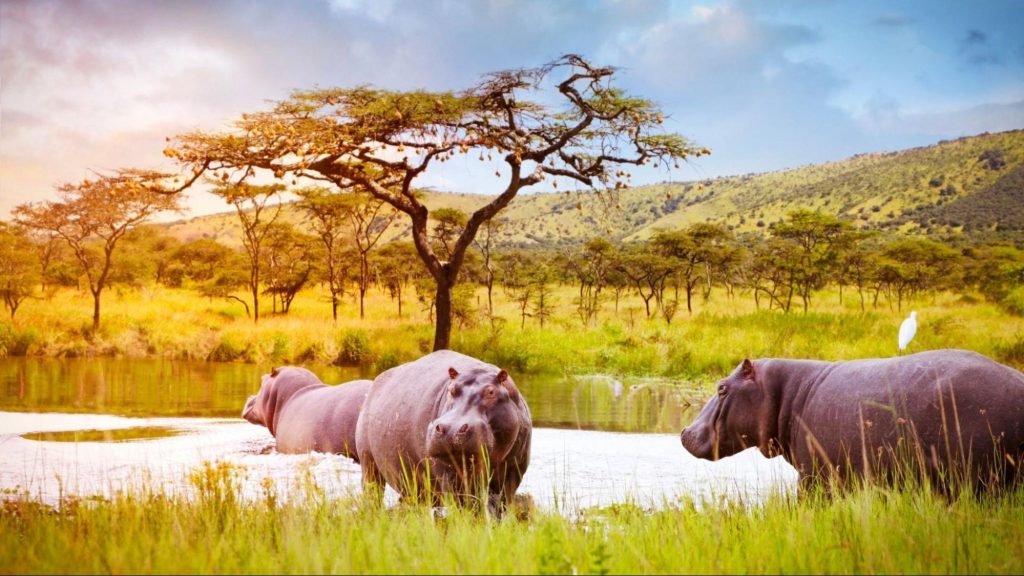
Animals in Akagera National Park
Akagera is home to many big mammals that are sure to get your excitement levels up. These include:
- lions
- rhinos
- elephants
- buffalos
- giraffes
- zebras
- leopards
The park also teems with various species of antelopes:
- bushbucks
- topis
- orbis
- waterbuck
- roan antelope
- duiker
- klipspringer
- the cape eland – the world largest antelope
Akagera is full of surprises, that’s for sure. In the deep waters of the swampy lakes, you’ll find schools of hippos and crocodiles basking in the sun.
The common primates found in Akagera are olive baboons, vervet monkeys, and blue monkeys. On a night drive, you’ll even catch glimpses of elusive bushbabies.
How many of the Big 5 are in Akagera?
Don’t worry. All the Big Five can be found in Akagera!
The park is home to the lion, the leopard, elephant, rhinoceros, and the African buffalo.
(Not so) fun fact: The Big Five animals received their title because they were considered the most difficult animals to kill by European trophy hunters in East Africa.
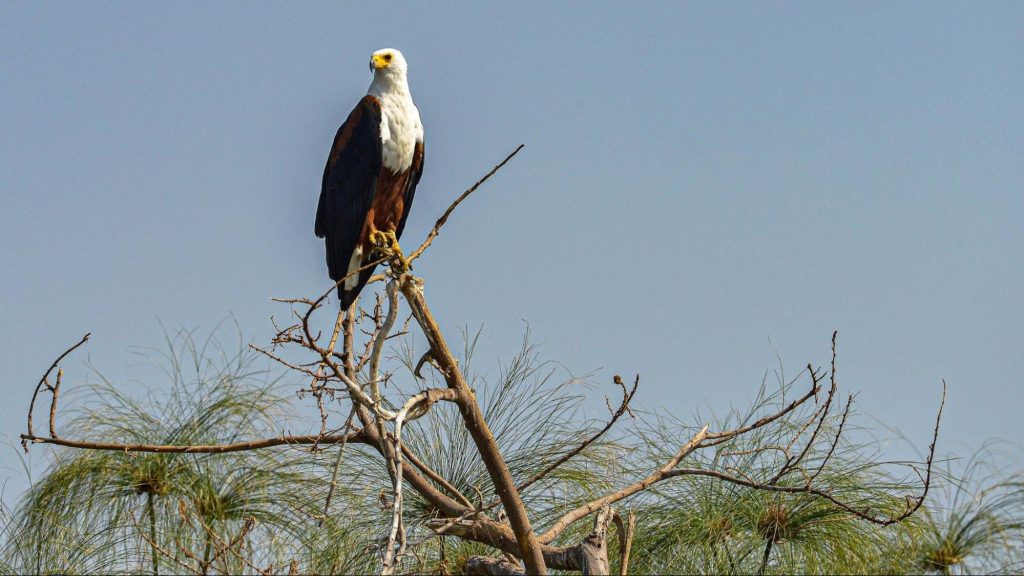
Birds
More than 482 bird species call Akagera home. These include
- lilac-breasted roller,
- goliath heron
- helmeted guineafowl
- African grey hornbill
- marabou stork
- cattle egret
- palm-nut vulture
- woodland kingfisher
- long-crested eagle and fish eagles
- African jacana
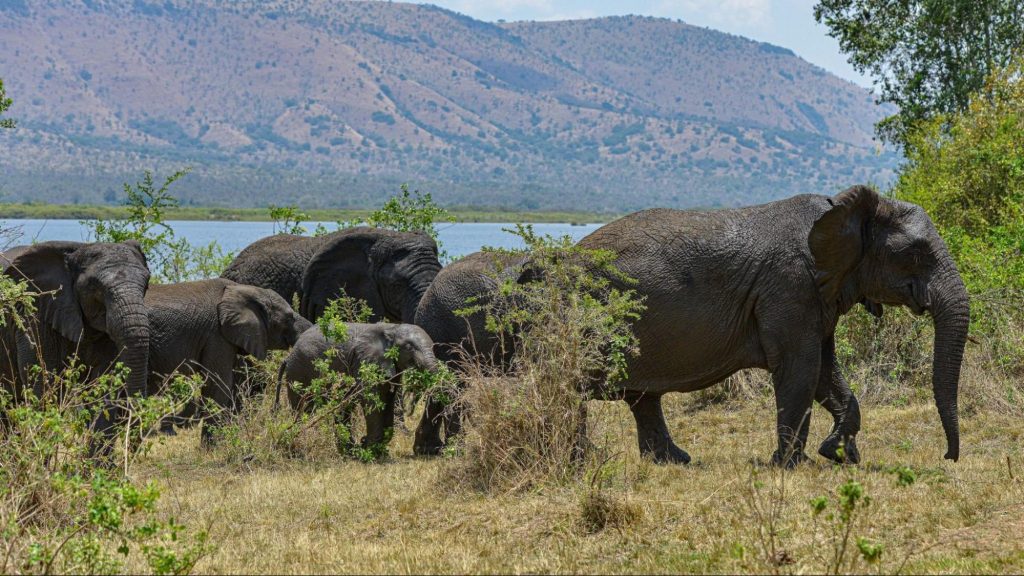
Elephants
A lot of people think that there is only one elephant in Akagera. However, that’s true.
This mistake results from stories about the famous elephant, Mutware (the Chief). It’s believed Mutware was abandoned by his two friends Mwiza and Helico, who were introduced o the park at the same time.
Mutware became very destructive due to loneliness and earned considerable fame as a result.
Mutware passed on in 2018 due to natural causes at the age of 48.
Lakes in Akagera National Park
There are 10 lakes within Akagera national park: Ihema, Shakani, Rwanyakizinga, Mihindi, Hago, Kivumba, Cyambwe, Nasho, Mpanga. You can explore every one of them when visiting the park.
The most commonly visited lakes in the park are Lake Ihema and Lake Shakani.
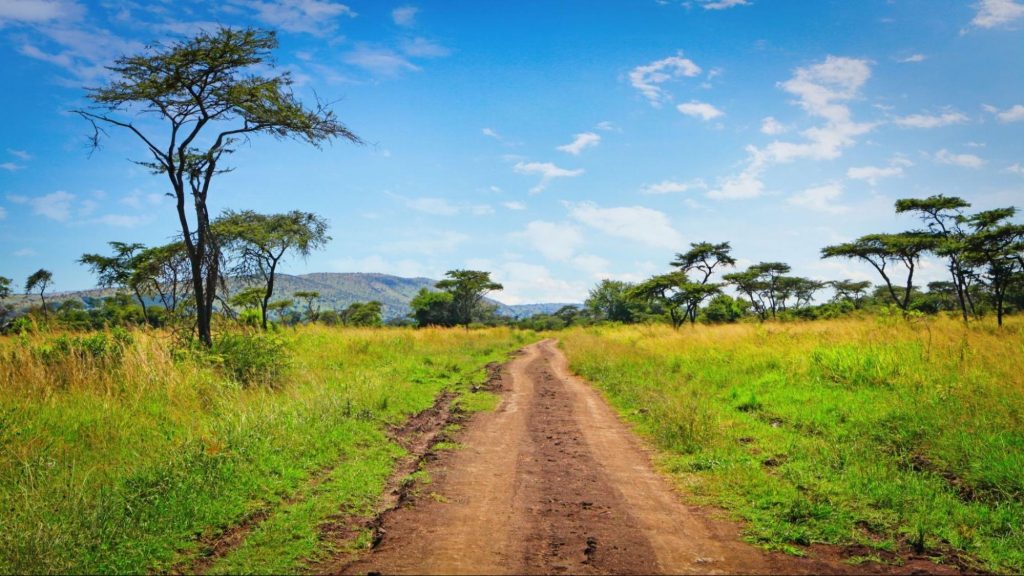
Location
Akagera National Park is located two hours East of Kigali, along the Rwanda-Tanzania border. There is an option of flying to the park using the services of Akagera Aviation for those not keen on the 2-hour drive from Kigali through Rwamagana town straight to the park.
How to Visit Akagera National Park
Once you have your budget ready, your sunscreen, and your sun hat on, it’s time to head out to the Eastern part of Rwanda for the time of your life.
Day trips from Kigali
For a one-day trip to Akagera National Park, You’ll probably depart at 5 am to make the most of your experience and ensure there’s enough time to see big mammals like zebras, giraffes, and beautiful gazelles running out and about.
The first game drive can last up to 4 hours, depending on the itinerary set by your guide and the movement of the animals.
Lunch will be included in your day trip package. Try a meal at Inzovu restaurant at Akagera Game Lodge. Or you can have a small picnic in the park if you’d like to be surrounded by nature.
The second half of the tour is a drive towards the exit in the afternoon. Birds are more active at this time, and most bigger animals are gathered around the lakes to cool off.
Overnight at a Lodge or Hotel
Now, if you are anything like me and think Shenzi and her friends were quite interesting (the hyenas in The Lion King), then you probably should opt for a two days experience. You get to go on a night drive and see hyenas and many more animals that take over when the sun goes down.
With a variety of hotels, campsites, and lodges like Ruzizi Tented Lodge or Magashi Camp, you are assured a relaxing time before you’re ready to go on with your second day in Akagera.
After all the excitement, what better way to end your trip than with a fishing activity on Lake Shakani, where you can see hippos, crocodiles, and different species of water birds.
3 Day Safari
The ultimate Akagera safari! Whether you plan your trip or need help from a tourism agency, your three-day safari will allow you to maximize what Akagera has to offer since what you might miss on the first day, you might see on the second or third day.
From night walks, boat cruises, game drives either during the day or at night, it is the ultimate Akagera experience for sure. The more time you spend, the more chances you get to see elephants, zebras, leopards, buffaloes, lions, hyenas, giraffes, and much more.
Activities
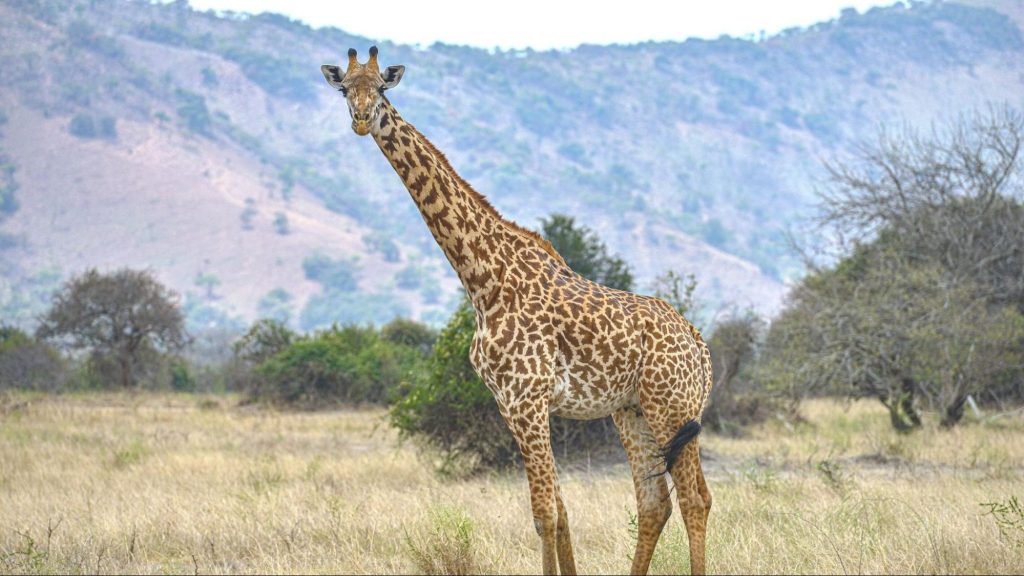
Game drives
On your game drive, you’ll see many animals living their lives and doing their morning routines. I personally experienced a couple of monkeys and baboons fetching food and feeding their young ones) on the road.
Predators such as the leopards, hyenas, and lions prefer to hunt in the early morning, which takes the whole game drive experience to another level. Throughout the day, it gets warmer, and most animals hide from the sun. So, starting your game drive early is the key to having an adventure of a lifetime.
Bird watching
Akagera national park is a popular and important birding area in Rwanda. Bird-watching enthusiasts will find birding at Akagera national park rewarding. You can bird-watch while on a game drive, nature walk with a ranger guide, and on a boat safari on Lake Ihema.
Boat safari
A boat ride on Lake Ihema is the best way to spend an afternoon in Akagera.
There are two options for taking a boat safari. Daily scheduled group trips happen multiple times during the day, but you can also book your private boat trip.
In addition to a variety of water birds, you will watch schools of hippos in the water and crocodiles by the shores of the lake.
Night Game Drive
Akagera National Park is the only national park in Rwanda where you can go on a night game drive. This is done with a park ranger and spotlight torches fitted on the vehicle for clear viewing of nocturnal animals, rarely seen during the day. These include hyenas, civets, bush babies, leopards, nocturnal birds, and other animals resting at night.
Cultural tours near Akagera National Park
Cultural tours around Akagera National Park allow you to observe and participate in traditional cattle grazing, milking, and traditional milk storage. You can even make traditional yogurt and ghee, and lastly, take part in preparing a meal with some of the milk products.
Cultural tours are an authentic cultural experience shared by the cattle-keeping communities near Akagera national park.
Nature Walks
Taking a nature walk is a perfect way for bird-watching because it allows you to experience your favorite species or any new ones from a closer distance. However, these walks are only permitted with a ranger guide. Night game drives and sport fishing on Lake Shakani is also an activity that requires booking and a guide.
Fishing
Fishing in Akagera-Lake Shakani is a catch and release type of fishing, even though sometimes you can be allowed to take one catch for a meal if interested.
Akagera Park Fees
| Details/Self-Drive Permit | Entry Fee per Person/1 Day |
| Rwandan/EAC Citizen (Age 6-12) | $11 |
| Rwandan/EAC Resident (Age 6-12) | $30 |
| International Visitor (Age 6-12) | $50 |
| Rwandan/EAC Citizen | $16 |
| Rwandan/EAC Resident | $50 |
| International Visitor | $100 |
| Vehicle Fees | |
| Minibus (Rwandan/EAC registered) | $10 |
| Omnibus/Overlander (Rwanda/EAC registered) | $20 |
| Minibus (Foreign registered) | $40 |
| Omnibus/Overlander (Foreign registered) | $100 |
| Guiding Fees | |
| 1 Guide/Half a day | $25 |
| 1 Guide/Full day | $40 |
[Click here to view the full 2021 pricing]
Hotels in Akagera National Park
For the full Akagera experience, one day is not enough. You need at least a 1-night adventure to experience everything. There is a small number of accommodation options ranging in prices from luxurious, mid-range, and budget-friendly.
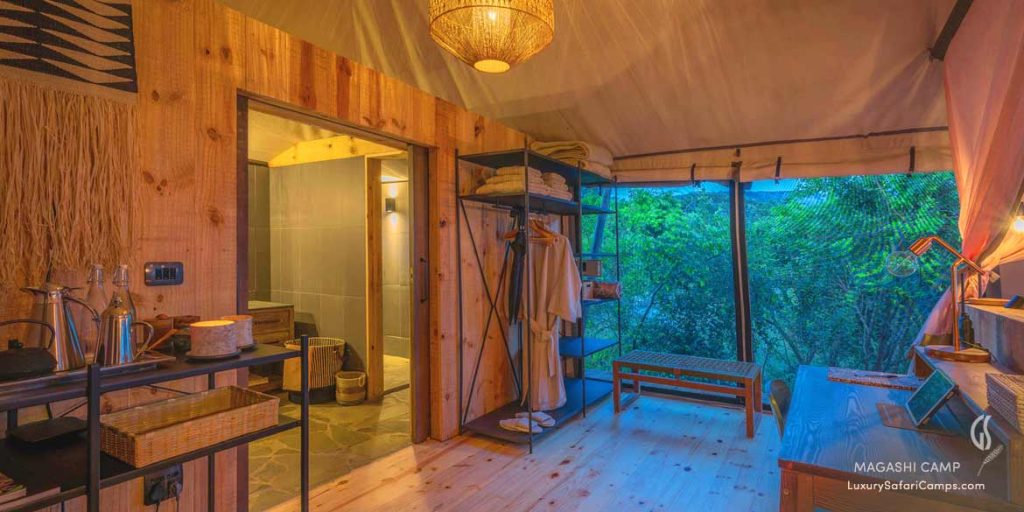
Six traditionally decorated tents on a private area of 14,826 acres, including the spectacular lakes like Lake Rwanyakizinga, offer exquisite scenery and views. Aside from that, bonfire decks and the pool are a highlight for anyone spending time at Magashi.
This lodge offers various activities, including guided safari drives, night walks, and boat cruises for bird watching.
Prices start from $470, including meals, accommodation, guided tours, and activities.
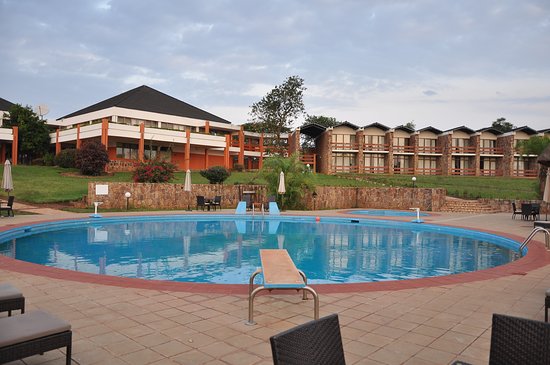
Akagera Game Lodge is a beautiful establishment with views over Lake Ihema, a swimming pool, a tennis court, the Inzovu restaurant, and a magnificently decorated bar named Imparagi.
Perfection, if I may say.
Prices start from $200.
Hotels Outside the Park
Not only can you find breathtaking accommodation inside the park, but right outside the park is located one of the best lodges in the area in general; The Akagera Rhino Lodge.
Akagera Rhino Lodge
Located just 10 minutes from the entry to Akagera National Park, the lodge is the perfect place to sit back, relax and enjoy magnificent views of central Africa’s largest protected wetland system.
At the Rhino Lodge, their specialty is groups. Friends getaways, family, or honeymoon packages are all available at great rates.
Compared to the other alternatives, it is the best budget-friendly option, even though it’s located outside the park.
Prices start from $50.
Camping in Akagera National Park
Shakani Akagera Campsite is located along the shores of Lake Shakani in the southern part of the park. It is the only lake in the national park where visitors can take part in fishing activities. The campsite provides camping tents, but campers are advised to bring along their equipment, such as sleeping bags, beddings, and food.
Mutumba Campsite is located further north. The campsite is situated in an area with beautiful savannah hills and a wide range of wildlife animals. Campers, however, are advised to bring their camping equipment.
Muyumbu Campsite is situated South on the edge of a hill, overlooking Ihema and Shakani lakes. The campsite is also enclosed within a fence to ensure the safety of campers.
Karenge Bush Camp is a seasonal camp set up twice a year in the dry seasons of June to September and December to February.
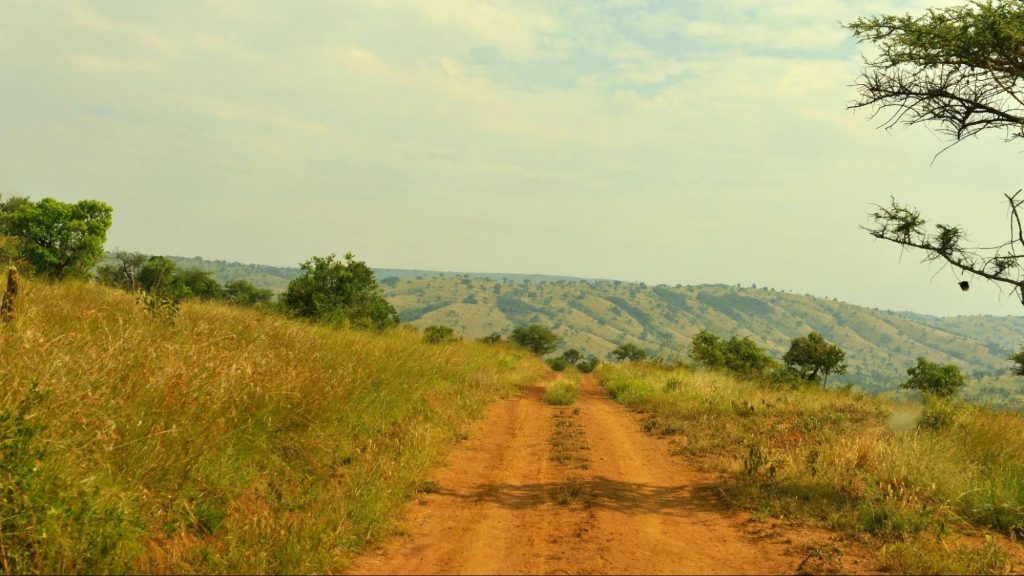
Weather in Akagera
Akagera’s temperature does not vary much throughout the year, but the climate is very different from Kigali. The long dry season (June – September) brings warmer temperatures. Cooler weather follows the rains (October – November, March-May). Generally speaking, temperatures typically range between 20 and 30 degrees Celsius.
Best Times to Visit
The June to September dry season is the best time to visit Akagera National Park.
It is an excellent time for game-viewing since grasses are short, making the drive smooth, and animals remain spread throughout the park due to abundant water in lakes along Akagera’s eastern boundary.
Akagera National Park experiences its peak season during the long dry season (June to September), and it tends to get super crowded.
During March and April, the rainy season, most dirt roads are ruined, making it hard to navigate, and wildlife viewing is much harder.
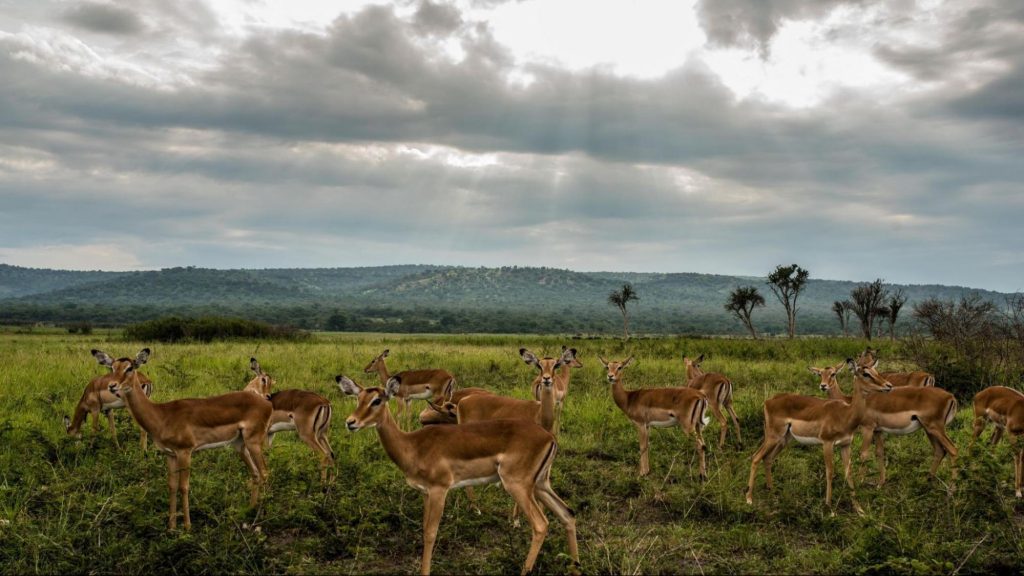
History of Akagera National Park
Akagera National Park was founded back in colonial times in 1934 by the Belgian government. It was established to protect the remaining wildlife species in the park that were under threat and to preserve 2500 square kilometers of savannah.
The park’s name is derived from the Kagera River that runs through it but originates in Tanzania.
In the aftermath of the 1994 genocide against the Tutsis, the government reduced the park’s size by half and gave the land to refugees returning to Rwanda.
However, this also drove much of the wildlife in the park to exile or lead to them being killed.
As a result, the lion and rhino families completely vanished from Akagera. Luckily, between 2015 and 2017, South Africa donated 7 lions and 18 rhinos to the park. This made Akagera the only Big Five park in Rwanda once again.
The conversation efforts were carried out by the Rwanda Development Board in partnership with African Parks, which has managed the park since 2010.
Since then, tourist visits have increased at a fascinating rate, which has managed to help the park finance itself at 75% and gradually growing.
Final thoughts
Akagera National Park is not to be missed by anyone visiting or living in Rwanda. The park’s spectacular scenery, diverse wildlife, and pristine lakes are an unforgettable experience that you’ll be raving about for years to come.
If you have been to Akagera National Park, don’t hesitate to leave us a comment and share your experience.
Frequently Asked Questions About Akagera National Park
How big is Akagera National Park?
With all the wildlife, lakes, and facilities; Akagera National Park covers 1,122 km2 (433 sq miles)
Where is Akagera National Park located?
Akagera National Park is located two hours East of Kigali, and it is within two districts: Kayonza and Nyagatare. It also runs along the Rwanda-Tanzania border.
How many lions are in Akagera National Park?
Since 2015 when the first 7 lions were reintroduced in Rwanda, the lion population has grown to almost 40 animals, and it keeps growing.
How many elephants are in Akagera National Park?
Today, Akagera national park has over 100 savannah elephants spread across the park.




I’m going to be in Kigali in July and am looking for something to do on a weekend. The one day game drive looks attractive. can I get more information? Pricing?
I went on a one day game drive yesterday using a driver and vehicle from Bizidanny Tours – one of the many tour operators in Kigali. Four of us in a big Toyoya where the roof lifted up to allow for better viewing cost the equivalent of $420 and that included park entrance fees. As I live in Kigali I paid in Rwandan Francs. Water is available on the truck but we took a packed lunch as we were a long way from the lodge at lunchtime. It’s the second time I’ve been, we had family staying with us and it is a good way to spend a day. This time we managed to see an elusive Akagera elephant so we were all pleased.
Any idea of camping gear (i.e. tents) are available for rent at or near Akagera?
Hey Jesse,
I don’t know for sure what the situation is but I do know that there doesn’t seem to be a lot going on around Akagera Park or the approaching towns. They’re just small places and I’d be shocked if you found a shop selling tents!
I think your best bet will be buying a crappy, overpriced tent at Nakumatt, bringing one from home, or borrowing one from a friend.
Cheers,
Kirsty
Hi Has anyone got a telephone number for Akagera Lodge please.
thanks
I would like to be part of the Rwanda safari next summer. Thanks for the post
The Park sounds awesome. I heard you can do boat trips on the river. Is that really the river or is it one of the lakes?
For high end accommodation, check out Ruzizi Tented Lodge. It is glamping at its best, and the price is reasonable for the quality.
Did you meet the awesome elephants
Hi, we are in Rwanda and we want to visit the country in different places.
But our first choice is akagera national park and we have organized our trip with our tour organizer and we need some couple or people to join us to cut the cost.
Our trip will be this Saturday 5,November ,2016
Let you go with us
Kterry(at)yahoo(dot)com
My clients would like to come in Rwanda for a game a drive in Akagera, they will be in Rwanda in July. they would like to spend 3 nights at camping site. Someone please recommend a good comping site.
You can try Mutumba campsite or even shakani campsite. They charge USD 25 per person per night to cater for camping grounds. However this does not include park entrance fees, or camping gears and tents.